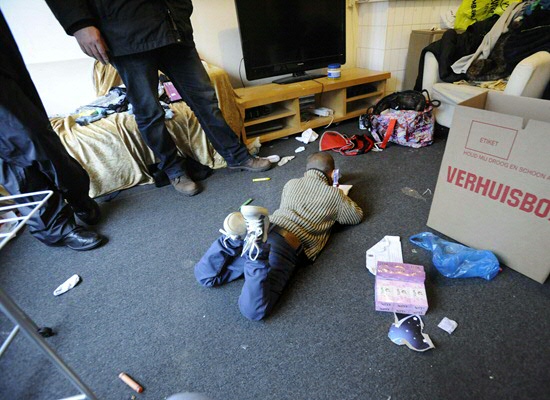‘Being evicted is a traumatic experience’
Every year throughout the world, hundreds of thousands of people are evicted from their homes. And yet housing is an international fundamental right. Which criteria do the courts use to decide whether or not to evict someone? ‘Neighbourhood Professor’ Michel Vols has been awarded a substantial European grant that will allow him to spend the next five years studying this question.
Housing is a fundamental right. This is set out in most national constitutions and in the UN’s International Covenant on Economic, Social and Cultural Rights (ICESCR). The UN recently supplemented the Covenant with a protocol stating that alternative housing must always be offered when people are evicted. That’s all very well, says Michel Vols, but what actually happens in practice? Particularly, if you look at the countless evictions that were enforced worldwide after the 2008 economic crisis? Rent arrears and mortgage debts meant that millions of people had to leave their homes. Vols expects that the coronavirus pandemic will exacerbate the situation.

Ending a tenacy agreement by sending a letter
‘The right to housing is relatively unknown. And in every country, the courts take a different approach,’ Vols explains. In the United Kingdom, a landlord can end a tenancy agreement simply by sending a letter – at a week’s notice. In Poland, on the other hand, landlords cannot evict a tenant, even if they refuse to pay the rent. Not even with a court order. These are two extremes in Europe. The legal right to housing is applied in very different ways. In Spain, municipalities must always offer alternative accommodation before serving an eviction order.
Anti-social behaviour
In 2013, the now-Professor of Public Order Law, Vols, rose to national fame for his PhD research into anti-social behaviour among neighbours. He became known as the ‘neighbourhood professor’. Some eight percent of people are bothered by anti-social neighbours; half of these problems involve noise. Vols, who was swamped with emails at the time, launched the www.overlastadvies.nl website in 2019. ‘We have already given over 2,500 pieces of individual legal advice’, he explains. ‘This gives tenants a tool to help them in their dealings with housing corporations. This could be along the lines of: “They managed to stop the anti-social behaviour in Amsterdam. Why can’t you do it here?”.’ Vols thinks that interventions in these cases should be less drastic, but carried out sooner. ‘That would be easier for all parties concerned. Housing corporations often advise tenants who are experiencing problems with neighbours to note down the incidents in a diary, whereas a properly enforced intervention would probably be more effective in changing someone’s behaviour. The intervention could, for example, be an obligation to seek professional help.’

Children involved
Vols was awarded an ERC Starting Grant of €1.5 million for his new research. ERC Starting Grants are awarded to excellent researchers who conduct pioneering research in Europe. His aim is to work out how the courts in Spain, the Netherlands and the United Kingdom come to their decisions about whether or not to authorize eviction. Last year, Vols discovered from his research that in a staggering 90% of cases, Dutch courts forgot to ask whether children were involved. ‘The Convention on the Rights of the Child (CRC) clearly stated that the interests of children must be taken into account in these cases’, he is keen to emphasize. This might be because in the majority of these cases, the defendants did not appear in court in person. ‘If a tenant is three months behind in their rent, the court will usually issue an eviction order. But they still need to check whether children are involved.’
Compassionate
This doesn’t mean that tenants are not relatively well protected in the Netherlands, says Vols. He thinks that housing corporations are ‘compassionate’ in the way that they deal with tenants who can no longer afford their rent. ‘They usually give tenants who are in danger of being evicted a second chance. You see that corporations don’t want people to be out on the streets.’ Some corporations use a court order as a tool to force tenants to accept other measures, such as budget management or administration.
Traumatic
Although Vols already has 1,000 evictions from the Netherlands, Spain and the United Kingdom in his database, he needs to have tens of thousands. This data-driven strategy is unique and innovative in the legal world, claims Vols. Reasons for eviction are known in individual cases, but he hopes to find a common thread in the courts’ reasons for deciding to evict someone. Linguists are helping with the research by studying certain patterns and word combinations in the rulings stored in the computer. He also hopes that these algorithms will generate ‘predictors’ that show when you can ‘expect’ an eviction. Vols: ‘The tenant having children could be such a predictor. And we are looking see whether the right to housing is mentioned in the rulings. I hope that our research will show how the courts could take this right to housing into account when coming to a decision. Being evicted is a highly traumatic experience.’
This article has been taken from our alumni magazine Broerstraat 5. Text: Nienke Beintema.
More information
| Last modified: | 09 February 2021 09.34 a.m. |
More news
-
05 March 2025
Women in Science
The UG celebrates International Women’s Day with a special photo series: Women in Science.
-
04 February 2025
'To entice is okay, to mislead is not'
In the supermarket, there is a carton of ‘blackcurrant juice’. At least, that is what it is called and what the picture on the packaging suggests. The list of ingredients, however, states that the contents are mainly made of apples and grapes. Is...
-
23 January 2025
Two UG researchers join The Young Academy
Prof. Björn Hoops and Dr Esther Metting are joining The Young Academy (De Jonge Akademie, DJA) of the Royal Netherlands Academy of Arts and Sciences (Koningklijke Nederlandse Akademie van Wetenschappen, KNAW). Every year, the DJA selects 10 talented...
